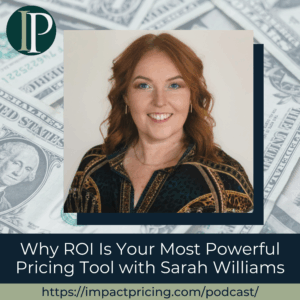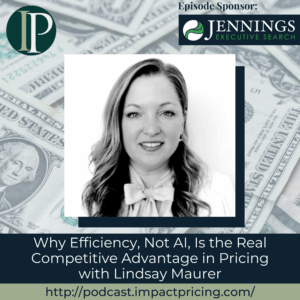Mark Raffan is a lover of negotiation, marketing, and behavioral science. Over the last few years, he started and grew the Negotiations Ninja Podcast to be the #1 negotiation podcast in the world.
In this episode, Mark shares his insights about the negative viewpoints around procurement and how to close winning deals through value-driven negotiation. Learn about the negotiation skills and strategies necessary for you to execute your action plan.
Podcast: Play in new window | Download
Why you have to check out today’s podcast:
- Learn about the key rules of negotiation to help you carry out your winning strategies
- Learn about the idea of concessions and how you can apply them in negotiations
- Learn how to meet the needs and wants of stakeholders who are coming from different perspectives to foster value-driven conversations
“Always ask for more than you expect to get.”
– Mark Raffan
Increase Your Pricing Knowledge: Become a Champions of Value INSIDER!
To sign up go to insider.championsofvalue.com.
Topics Covered:
01:23 – From a sales and procurement background, one thing led to another and finally to negotiation. That’s how Mark would describe his journey to negotiation.
03:29 – If it is a way to make you believe a certain thing that isn’t necessarily true, but not saying a lie, then you’re just being psychologically conditioned to believe one thing. This is in defense of the procurement guys.
06:26 – Sales and procurement are coming into an antagonistic viewpoint of each other. This doesn’t help in reaching a value-driven conversation.
08:49 – Mark’s thoughts on the zero-sum game of pricing.
09:28 – The more we can just have rational, normal conversations, I think it’s just going to be better for everyone. Mark’s idea of getting alignment where sales and procurement are concerned
11:33 – People’s misconception about negotiation is that you can’t ask. Mark clears that up.
12:15 – There is ego involved in not asking. This is the reason why negotiation fails.
14:33 – What is expected of negotiations – making sure someone feels good about the negotiation, and making everyone believe you’re meeting those needs and wants for every discussion.
15:55 – What a value-based conversation should be – asking why?
17:14 – Patience wins, and why Mark agrees.
17:31 – Don’t let your CEO negotiate. Mark discusses his thoughts.
18:02 – If you give something, you get to get something. Giving his thoughts about the idea of concessions.
21:14 – Shut your mouth. This is one great negotiation tip Mark shares.
22:29 – Mark’s piece of advice – Plan. Doing strategy work and research will help in your success.
23:23 – Why do the planning? Understanding the value on the other side of the table helps you execute those strategies.
24:53 – Sharing his best pricing advice.
25:26 – What is it that Mark convinced Mark Stiving about?
Key Takeaways:
“We have different needs and wants. And so obviously you have to try and meet those needs and wants for every discussion. Or make the person believe that you’re meeting those needs and wants for every discussion.” – Mark Raffan
“You should never be doing a one-way concession and you should never be committing to a concession before getting a commitment in return.” – Mark Raffan
“So many of us go into a negotiation negotiating with ourselves before we even go in. We think that we’re going to be asking for too much.” – Mark Raffan
“There’s got to be some additional reasons why you want the sale. And the reason that you do the planning is to build up the strategy so that you can get those reasons executed.” – Mark Raffan
Resources Mentioned:
Connect With Mark Raffan:
Connect with Mark Stiving:
- Email: [email protected]
Full Interview Transcript
(Note: This transcript was created using Temi, an AI transcription service. Please forgive any transcription or grammatical errors. We probably sounded better in real life.)
Mark Raffan: Always ask for more than you expect to get.
[Intro]
Mark Stiving: Welcome to Impact Pricing, the podcast where we discuss pricing, value, and the negotiated relationship between them. I’m Mark Stiving. Today our guest is Mark Raffan. Here are three things you want to know about Mark Raffan before we start. He’s founder and host of the Negotiations Ninja Podcast, the number one podcast on negotiations. So we have high expectations of him as a guest. He teaches negotiation skills and he reads a lot. His most recent book, he’s reading Storynomics right now. So welcome, Mark.
Mark Raffan: Thank you. Thank you for having me, Mark. It’s a pleasure to be on your show, man.
Mark Stiving: I tell you what, I am so excited about this. Now I posted on LinkedIn that I needed someone from procurement who is going to defend procurement to come on the podcast. I got a bunch of suggestions. And so you’re the one that I chose. And hopefully, you do a great job. We’ll find out.
Mark Raffan: Hey, man, I always do a good job.
Mark Stiving: Good, good, good. So, well first of all, before I tell the story, and why I want to do this, let me ask you, how did you get into negotiations?
Mark Raffan: So my background is all sales and procurement. So I’ve lived both sides of the table, right out of university, sort of little financial ad sales for a while, paid off all my student loans, and then went on to the procurement side of things, worked in procurement for the vast majority of my career, and then three years ago, went out on my own to start training and coaching people on how to negotiate.
Started off as a blog, the negotiations turned into a blog. Then it turned into a podcast and then the podcast started to get some steam and then people said, ‘Hey, you should come and train our procurement team on how to negotiate.’ I said, Sure, I’ll do that. And then one thing led to another and here I am today.
Mark Stiving: Okay, so now it’s time for the story. It’s probably my single worst experience with procurement and why I don’t like procurement people is it feels to me like they always lie to us. And when I say us, I’m talking about the sales side. Okay, now I know that salespeople sometimes lie, too. There are jokes, when do you know a salesperson is lying – when his lips are moving. And I got it, I got it. But for some reason, it just really bothers me on the procurement side.
Mark Raffan: Okay, so why do you think they’re lying?
Mark Stiving: Well, I was in a company where we were buying a multimillion-dollar piece of software. I was leading the selection committee. And when it was time, we’d already decided, here’s what we’re going to go buy. We call in the vendor, I’m in the meeting with the procurement guys, their very first meeting, the procurement guy looks at me and says, we’re considering three different alternatives, the other two are much less expensive than this one.
Mark Raffan: Was that true?
Mark Stiving: No, absolutely not. Not even clear.
Mark Raffan: Then that was a bold-faced lie. I don’t agree with it.
Mark Stiving: Okay.
Mark Raffan: Look, let me be frank right away. I am not a fan of dishonesty, and I’m not a fan of lying. And if that was true, then I would say go for it leverage that big time. But if it was not true, then that’s a lie and I disagree with it wholeheartedly.
Mark Stiving: Okay, so first of all, I love hearing you say those words. But now you got to talk me down off the edge because you got to convince me that not every procurement person is doing this.
Mark Raffan: They’re not. So let me walk you through a couple of things. So procurements job is much the same as sales just from the opposite side of the table, right? So sales job is to get as much value out of the deal as possible to close the deal, then move on to the next one. Your job is to make money.
Likewise, in procurement, our job is to get the best value as well. Now that’s not necessarily a result of price reduction all the time. It’s also a result of risk reduction. It may be a result of efficiency gains, it may be measuring effectiveness through proper SLAs, KPIs, but the entire goal of procurement is to get the best value. And throughout that process, some of the time, it may seem like you’re being conditioned to believe one thing.
Now, if it’s a bald-faced lie, I 100% disagree with that approach. If it is a way to make you believe a certain thing that isn’t necessarily true, but not saying a lie, then you’re just being psychologically conditioned to believe one thing. So if I had said to you, if I was that procurement person in that meeting, I wouldn’t have said, you know, we’re looking at other options, and they’re much cheaper, I would have said to you, hey, we’re looking at other options, which was true, right? We’re looking at other options, and they’re very competitive. So that’s not a lie. But now you have to decide whether or not you’re going to compete.
Mark Stiving: Yeah, so the part to me that was really the lie was that we were looking at other options because as a committee, we’d already made the decision. We’re going to go buy this. Now we had looked at other options, there’s no doubt about that.
Mark Raffan: And so, is your question then, if I had said to that person, we are looking at other options, or should I have said we have looked at other options, and they’re very competitive?
Mark Stiving: Yeah, so that would certainly be more honest.
Mark Raffan: Yes. So look, here’s the thing, if I was a procurement person, and I told you as a salesperson, hey, we’re really happy with what you’re doing. And we want to buy your stuff. How much leverage do I have in that conversation now?
Mark Stiving: Very little, zero. No, I get it completely.
Mark Raffan: Right. And so I have to make you believe that you’re still competing. And so if I can make you believe that you’re still competing, which you are, because we haven’t made a decision yet, and the decision isn’t made until I’ve signed the contract, then I have to make you believe that that’s true.
And so if I sit you down at a table and I say, look, here’s the situation we have looked at other options and they are very competitive. That’s not a lie. But to say to you ‘Hey, we are looking at other options and they are much cheaper.’ That’s dickhead news. And I don’t agree with that.
Mark Stiving: Yeah. And so I see procurement people. The problem is this one experience or this one piece of procurement is just stuck in my head. And yet procurement people do so many things that are valuable to the company. So I’m just trying to slap this out of my head if I can.
Mark Raffan: Yeah, look, I understand. I mean, I think we all come to the table with baggage, right? Like, as a salesperson, when you go into meet someone, you’re coming in with a lot of baggage as well, because people view you a certain way, as a procurement person, when I meet with a salesperson, they’re gonna view me a certain way. And that just has baggage to it.
Look, at the end of the day, you’re dealing with people, first and foremost. And so the generalizations that you have in your mind has been built up because you may have been burned on one or two occasions. And now you’ve got this, probably this oversimplified view of what procurement does or who procurement is.
And likewise, procurement people do exactly the same thing when they think about salespeople. I think what we need to do, and I’ve spoken to barrows about this a few times, is we need to have just more honest and open conversations with each other. Like, look, we’re both, essentially, we’re both aligned, right? Like you have something that you want to solve a problem with, and you want to sell that to us. And I want to buy something to solve that problem.
So essentially, we’re aligned, now we’re just trying to figure out terms. And so I think if we come in with the thought process of like, ‘Look, we’re both aligned. We both want to solve the problem.’ I mean, we both got the same customer, essentially. Now we have to figure out how we’re going to solve that problem, then it becomes a much easier conversation. I think far too often we’re coming into this very, with an antagonistic viewpoint of each other, right, with a ‘put up your dukes’ sort of attitude with each other. And that’s just, it’s just not conducive to any kind of value-driven conversation. So that’s not the way to do it.
Mark Stiving: I think it’s absolutely fair to say, in 99% of business and 99% of the conversations that we’re going to have between procurement and sales, companies, and buyers. We’re trying to grow the amount of value that we’re transferring from one company to the other. So we’re trying to figure out how do you know, how much value is there? And how can we increase that value? Because the more value I deliver, the more I’m going to get paid, the more value they get, the more willing they are to pay. Total. The thing is, once it comes to price, that is the one thing that is a zero-sum game. Right? If I raise the price by $1, you pay me $1. You have $1 less in your pocket, and I have $1 more in my pocket.
Mark Raffan: Yeah. Or it could be to do with volume. I mean, especially if you’re working with a SaaS deal, right, like, depending on how many seats I buy, obviously is going to depend on how much pricing I get. You win, I win. Right, and I hate that the term win-win. Let me just be clear. But there’s that expectation that it’s more than just pricing those kinds of deals as well. So I would argue against the zero-sum mentality on price because it doesn’t have to be that way.
Mark Stiving: I’m going to give you a chance to convince me, but here’s how.
Mark Raffan: Am I not on the show for – you’re supposed to be convincing me? Isn’t that what this is all about, Mark?
Mark Stiving: No, no, I’m trying to change my mind.
Mark Raffan: Well, hopefully, I can help you get there. So I mean, if I’m gonna convince you of anything, just bear in mind that the people that you’re dealing with in procurement are people, and the more that we can just have rational, normal conversations, I think it’s just going to be better for everyone. And look, we’re not all there yet.
There are organizations and industries that are significantly further behind than others when it comes to building those types of relationships. Like if you look at the industrial space, for example, compared to the SaaS space, it’s night and day, like it’s totally different. But that doesn’t mean that we can’t open up about those conversations.
One of the key things that I think a lot of people go into negotiation thinking is that your assumption of how to negotiate and my assumption of how to negotiate are the same, right? You believe that negotiation should be one way. And I believe that negotiation should be one way. And that’s not necessarily true.
And so before we go into the actual negotiation, we actually need to talk about how we’re going to negotiate. Cal Jensen, who is this professor in Arizona, talks about the level of trust in a negotiation, he talks about negotiating how to negotiate prior to going into the negotiation.
And as long as we can get alignment on that, then it makes the conversation after that really, really easy, but for you to assume that the negotiation is going to go one way. And then for me to do the same thing, we’re naturally going to come to a point where we butt heads.
Mark Stiving: Yeah, I think that’s a big problem. In a lot of cases – I’d like to share with you my favorite negotiation story, This isn’t even negotiations but I was traveling with a buddy of mine for a long time, and we would go out to eat dinner regularly. He was teaching me how to do something. And we would always order wings because I just love wings.
And I didn’t want to hog all the drumsticks, we’ll call one the drumstick and one the knuckle. So I would always eat half the drumsticks and half the knuckles. And we’ve been traveling together for months. And one day we had a conversation and it turns out he liked the knuckles more than he liked the drumsticks. Yet, I like the drumsticks more than I like the knuckles. It’s like for six months I’d been suffering.
Mark Raffan: If only you had asked, that’s the thing that I think is like – so many people have the misconception in negotiation that you can’t ask. And that’s the single most important thing you can do, is ask. Ask questions. Be open about where you have misunderstandings. ‘Hey, I misunderstand something here. I just want to make sure that we’re on the same page’, like, what have you lost in that conversation?’ You’re gaining clarity. That’s all it is. Right? Because I think there’s a lot of pride that gets wrapped up in negotiation, and it’s just foolish.
Mark Stiving: So you think they just don’t want to look stupid. They don’t want to look like oh, yeah, I don’t know the answer.
Mark Raffan: Totally. And I think it’s a lot of fear as well. A lot of people have a fear of rejection, fear of ridicule. And so they feel like if you asked something, you’re going to get rejected, or you’re going to get ridiculed. The problem is you carry around that shit like luggage for the rest of your life, right?
You’ve had one bad, two really bad experiences earlier on in your life. And now, you know that that ego has been hurt. And every now and again, when you’re about to ask for something that’s more than you expect to get or to gain clarity on something, it pops its head up and goes, ah, you shouldn’t do that. Last time you did this, you hurt us, us so just keep your mouth shut and let’s calm down.
Advertisement
I love teaching pricing and value, but I get a little frustrated. It’s hard to implement what you’ve learned after just one class. There are always nuances to what you learn in a classroom that just isn’t easy to recall when you’re trying to implement them in your own real-world project to most pricing feels so risky. To solve this, we’ve come up with our part-time pricing expert programs.
In each program, I learned enough about your business to guide you as you explore and implement new pricing capabilities and new value discovery approaches. We’ve put together three distinct programs to assist with a range of scenarios from a single project or to help a team within your company improve their decisions to developing your own in-house pricing expertise. I think the pricing is fun, and you might, too, if it wasn’t so scary.
If a little guidance, expert counsel and sound advice would be a benefit on your next pricing initiative, please reach out to me at [email protected]. We only have room for a few more companies.
Mark Stiving: If I were going to summarize the lesson I would take out of what we just talked about, it’s when I talk to salespeople I talk to them about, you got to have these value conversations, we have to listen to our customers, we want to understand where the value comes from.
Now, this is when they’re trying to sell to the committee, to the users, to the people making decisions. And we really need to do the exact same thing when we go talk to procurement, right, we need to have the value conversation even though their value is probably different than the value from the committee. We need to know what matters to them and what they’re shooting for.
Mark Raffan: 100%, you’re not just negotiating with one person, right? There are multiple stakeholders in each negotiation, and each and every single one of them has their own needs and wants. So for you to assume that you’re going to negotiate the same way with a procurement person as you do with the business use of your product or service is insanity. We have different needs and wants. And so obviously you have to try and meet those needs and wants for every discussion. Or make the person believe that you’re meeting those needs and wants for every discussion.
And that’s the key, right? Because perception is everything in negotiation. And so making sure that someone feels actually good about the negotiation. I used to have an old mentor, the craziest thing that he used to say to me about negotiation is ‘Look, I’m not happy till the vendors are not happy.’ And I was like, ‘That’s insane!’ Like, why don’t you want them to feel good about this experience?
Or like, can’t you build something in to have them feel good about this? And that old mentality is still sticking around to a large extent in a lot of different industries. And for a lot of procurement people, that’s how they’ve been taught, is this very, like, it’s me versus you kind of thing, but it’s going away. We’re getting there. We’re not getting there as fast as I would like, but it’s going away.
Mark Stiving: I think there are a lot of examples of those drumsticks versus knuckles where if we had conversations we’d find win-win situations, you know?
Mark Raffan: Well, I mean, look, there’s a famous negotiation story of the egg or the orange, right? So, two people in a zero-sum negotiation are arguing over an orange. One person wants the orange and the other person wants the orange. And they argue, I want the orange. No, no, I want the orange. No, I want orange. And they could argue like that to the end of time. But if one person had to ask why they want the orange, then they may have discovered that, hey, you know, that person only needs the orange peel for a baking recipe. Or that person only needs the orange innards, for juice. And they could both get the thing that they need out of that orange if they only asked why. And I think we do ourselves a disservice by not having those value-based conversations that you were mentioning.
Mark Stiving: Yeah, this is spectacular. Well, since I have a negotiations expert on the line now, can I toss-up – I teach pricing right and as part of pricing, I usually give a few negotiation hints when we have these conversations. Sure, I want to toss this out and you can just elaborate on them or say, Mark, you’re totally messed up.
Mark Raffan: Sure, go for it.
Mark Stiving: But one of my favorite rules is patience wins.
Mark Raffan: Totally agree with that. And I think that patience is a very difficult skill to master. But it is probably one of the single most important things you can master in negotiation.
Mark Stiving: Yeah, the corollary to that is, don’t let your CEO negotiate.
Mark Raffan: Yeah, I would actually agree with that. Because they’ve been out of the game for a really long time, man. And they generally fuck things up when you bring them to the table.
Mark Stiving: Yeah, well, and they want to win and they’re not patient people. It’s like, right. Okay, got it. So good. Salespeople want CEOs to negotiate because they know the deal will get closed quickly.
Mark Raffan: Yes. But you lose so much value in the process. Excellent problem.
Mark Stiving: So what about, ‘if you’re gonna give something you got to get something’.
Mark Raffan: So yeah, give and getting or reciprocal concessions is super, super important. A lot of people misunderstand concessions in a big, big way. So the whole definition of a concession is you asked for something I give it to you, right? And so many times it’s viewed as one way right? A procurement person asks for something, you give that procurement person that thing because they asked for it. But at no point in time, have you evaluated the cost of that concession to you and the perceived value of that concession to the procurement person. Because those are two different things.
Your cost and their perceived value may have a massive delta. Now, before going in to the negotiation, you really need to understand, Okay, what are the concessions I’m willing to give so that you don’t give too much away, because if you don’t plan for your concessions, I promise you, you’re going to give way too much away, and then, what’s the objective cost that my company has allocated to each of those concessions?
Now, what is the perceived value of that concession to the procurement person or that procurement person’s company? And if I notice that that is higher than my cost, now we’ve got a trade imbalance, right?
So if I give you something that’s of the high cost to me or on low cost to me, and high value to you, I’m losing out on an opportunity to ask for something in return that’s of high value. So I need to do a better job of being more hypothetical in those circumstances. Instead of just being one way, you asked for something as a procurement person, I would say to you, look, if I can get you this thing, and it’s an IF because I don’t know if I can, but if I can get you this thing, can you do X for me?
And now we asked for that thing in return. You should never be doing a one-way concession and you should never be committing to a concession before getting a commitment in return. Now, the funny thing about concessions is that I can actually make you believe that the value of this concession is worth more than it actually is just because of scarcity, right? So the more scarce that something is, the higher that value of that thing goes.
So if I hold on to that concession for a little bit longer and make you work for it, the value of that concession that goes up, right? Think of it this way, you buy something off of Craigslist, you go to someone’s door, you knock on their door, they were selling it for 100 bucks, you say, Look, I’ll buy it for 80. And they say Yes, right away, and you’re like shit, I should have asked for more.
But if you had negotiated for 15 minutes and still come up to 80, you would have felt better about it. That’s just because of scarcity. So naturally, we should be doing the same thing in our negotiations, I should make my concessions more scarce, thus increasing their value and asking for something more valuable in return.
Mark Stiving: Yeah, so I think my favorite part of that answer was, if I can do this for you, and that’s just an if.
Mark Raffan: Yes, don’t commit to the concession before you get a commitment in return.
Mark Stiving: Yeah, that’s really nice. Okay, so those are my two big negotiation keys, you got a couple that you can share that are pretty, I don’t know, generic and powerful?
Mark Raffan: Yeah, shut your mouth. Basically, well, after you’ve asked for something, shut your mouth. Don’t try and justify requests. Don’t try and fill the awkward space of silence because there is an awkward space of silence, just ask for something. Let it sit, shut your mouth, and wait for the response. So many of us go into a negotiation negotiating with ourselves before we even go in.
We think that we’re going to be asking for too much, right? So we’ll say, I can’t ask for that. That’s too much. I should ask for something more reasonable. And we negotiate with ourselves and we come in and we ask for less than we were actually going to go in with. The problem with that is you’ve essentially crushed your dreams before you’ve given someone else the opportunity to correct your dreams, right? Like, why would you do that? So just go in and ask for what you’re gonna ask for, wait for the response and then respond. Just keep silent as much as you can. That’s the first piece of advice that I would give anyone on a tactical basis.
Mark Stiving: I think that’s a great piece of advice. Now, I’m a speaker, and I train speakers and one of the hardest things for new speakers to do is to pause, to just be quiet. And so it’s the same thing in negotiations – just shut up.
Mark Raffan: Yeah, a hundred percent. Just keep your mouth shut. It’s amazing how much people will fill the void if you just let them and that’s the key, just let them fill the void. So that’s the first piece of advice. The second piece of advice that I would give is on strategy, just plan, plan plan.
Be prepared for your negotiation as best you can, do as much research as you can. Do as much pricing research as you can, do as much strategy work as you can before you go in because it’s only going to help you, and so many people are winging their negotiations, they just go in and wing it. And that’s terrible. I mean, you’re just not going to be able to repeat the success that way.
Mark Stiving: Yeah. So when I hear you say, plan, plan plan, in my mind what I think is, see how much you can understand the value on the other side of the table. And there’s probably more to it than that. But to me, that’s the most important thing because I’m a pricing person.
Mark Raffan: Totally. It’s definitely about value. It’s also about understanding who the other party is, the other company, how they negotiate culturally – there are certain companies that negotiate certain ways, right? I mean, you look at old school Oracle, like back in the day, they definitely had a certain way of negotiating, you look at a lot of like, single-source chemical suppliers in the world. They definitely have a lot, a certain culture around how they negotiate. It’s also about looking at the financials. I mean, is this company going to be around, I mean, especially now, right? Like, are they liquid?
Are you doing proper financial analysis on determining whether they can actually afford to buy your stuff on an ongoing basis? Is it going to be a short term or long term? Is it tactical? Or is it strategic?
What is the reason that you actually want this deal? It’s not just to make money. Right? Making money is nice. But that’s not the ultimate goal. Is it to break into a new market? Is it to get a new customer? Is it to create a new champion? What’s the reason? So there’s got to be some additional reasons why you want the sale. And the reason that you do the planning is to build up the strategy so that you can get those reasons executed.
Mark Stiving: Nice, Mark. We’re pretty much out of time. Now, I normally ask people this question. So I’ll ask you anyway, even though it’s not related to what we’ve been talking about, what’s the best piece of pricing advice you could give our listeners that you think could have a big impact on their business?
Mark Raffan: Always ask for more than you expect to get.
Mark Stiving: Oh, that’s great. That’s great. So I’ll take that as raise prices.
Mark Raffan: Every procurement person in the world right now is going, Nah. You idiots, you’re ruining it.
Mark Stiving: Mark, thank you so much for your time today. If anyone wants to reach out to you, how do they do that?
Mark Raffan: The best way to reach me is on LinkedIn. You can just look up Mark Raffan on LinkedIn. I’m very active online. And that’s probably the easiest way. But before we close, did I convince you?
Mark Stiving: I think what you convinced me of is to look beyond the unethical behavior of some procurement people.
Mark Raffan: Minority of procurement people.
Mark Stiving: Yeah, it isn’t all. Yes. And I think that I hadn’t even thought this until before we had this conversation. But I have to be equally upset at salespeople when they go lie if I’m going to be upset about procurement people when they lie, so that seems like a fair trade-off there. Yeah. And then I want to get everybody to stop it.
Mark Raffan: Yeah. And I would say that it’s like, it’s the minority on both ends. But the unfortunate thing is one bad apple spoils the bunch. Right. So that’s what we have to live with on both of our professions, unfortunately.
Mark Stiving: Yep. Excellent. All right, Episode 75. All finished. That was awesome, Mark. Thank you very much. So my favorite part of today’s podcast, I would say it’s the fact that Mark just came out and said, ‘Look, that was unethical, don’t do it.’ He doesn’t believe in it. And so I can honor that really well. So to our listeners, what was your favorite part? Please let us know in the comments or wherever you downloaded and listen, while you’re at it, would you please leave us a five-star review?
My marketing team has just convinced me that I’m going to give access to our value-based business course at championsofvalue.com to anyone who leaves us a review, no matter how many stars you choose, and just take a screenshot, send it to me and I will give you access to our value-based business course.
Extremely valuable and I hope you all take me up on it. Besides that, don’t forget we have the free community at community.championsofvalue.com. If you have any questions or comments about the podcast or about pricing in general, feel free to email me mark@impact pricing. com. Now, go make an impact!
Tags: Accelerate Your Subscription Business, ask a pricing expert, pricing metrics, pricing strategy
















